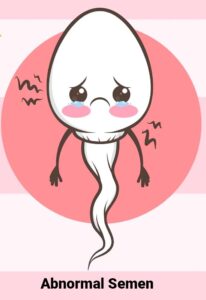Abnormal semen
Abnormal semen refers to semen that deviates from the normal characteristics in terms of its appearance, volume, consistency, and/or composition. Semen is the fluid ejaculated from the penis during sexual climax and contains sperm cells along with other components.
consistency, and/or composition. Semen is the fluid ejaculated from the penis during sexual climax and contains sperm cells along with other components.
 consistency, and/or composition. Semen is the fluid ejaculated from the penis during sexual climax and contains sperm cells along with other components.
consistency, and/or composition. Semen is the fluid ejaculated from the penis during sexual climax and contains sperm cells along with other components. Causes
Abnormal semen can have various causes, and it may be influenced by factors related to sperm production, sperm transport, or seminal fluid composition. Here are some common causes that can contribute to abnormalities in semen:
1. Hormonal imbalances:
Hormonal imbalances can affect sperm production and function. Conditions such as hypogonadism (low testosterone levels) or hyperprolactinemia (elevated prolactin levels) can disrupt the normal processes of spermatogenesis.2. Testicular factors:
- Varicocele: A varicocele is a swelling of the veins within the scrotum, which can increase testicular temperature and impair sperm production.
- Testicular trauma or injury: Trauma to the testicles can cause damage to the testicular tissue, affecting sperm production and quality.
- Cryptorchidism: This is a condition where one or both testicles fail to descend into the scrotum during fetal development. It can lead to abnormal sperm production.
3. Genetic abnormalities:
Certain genetic conditions can affect sperm production, motility, or morphology. Examples include Klinefelter syndrome, Y chromosome microdeletions, or chromosomal abnormalities.4. Infections:
Infections of the reproductive system, such as sexually transmitted infections (STIs) or epididymitis, can cause inflammation and damage to the reproductive organs, affecting semen quality.5. Medications:
Some medications, including certain antibiotics, hormone therapies, chemotherapy drugs, or anabolic steroids, can interfere with sperm production or function.6. Lifestyle factors:
- Smoking: Smoking tobacco can negatively impact sperm count, motility, and morphology.
- Alcohol and drug use: Excessive alcohol consumption and illicit drug use can impair sperm production and quality.
- Obesity: Obesity is associated with hormonal imbalances and can contribute to abnormal semen parameters.
- Heat exposure: Prolonged exposure to high temperatures, such as saunas, hot tubs, or tight underwear, can affect sperm production.
7. Medical conditions and treatments:
- Chronic illnesses: Conditions like diabetes, kidney disease, or liver disease can affect semen quality.
- Cancer and treatments: Some cancer treatments, including chemotherapy, radiation therapy, or surgery, can impact sperm production and fertility.
Symptoms
Abnormal semen itself may not typically cause noticeable symptoms. However, the underlying conditions or factors contributing to abnormal semen can sometimes manifest with specific symptoms. Here are some potential symptoms associated with conditions that may lead to abnormal semen:
1. Hormonal imbalances:
Symptoms may include decreased libido, erectile dysfunction, fatigue, mood changes, or changes in body hair distribution.2. Testicular factors:
- Varicocele: Varicoceles often do not cause symptoms, but in some cases, they may cause a dull pain or discomfort in the scrotum, especially after prolonged standing or physical exertion.
- Testicular trauma or injury: Symptoms may include pain, swelling, or bruising in the testicles or scrotum.
- Cryptorchidism: A visible absence of one or both testicles in the scrotum is the primary symptom of cryptorchidism.
3. Infections:
Symptoms of reproductive system infections, such as sexually transmitted infections (STIs) or epididymitis, can include pain or discomfort during urination, genital discharge, testicular pain or swelling, or urinary frequency.4. Medications:
Symptoms related to medication side effects can vary depending on the specific medication and individual response. Common side effects may include changes in libido, erectile dysfunction, or changes in mood or energy levels.5. Lifestyle factors:
- Smoking: Smoking-related symptoms are not directly associated with abnormal semen but may include respiratory symptoms, reduced exercise tolerance, or other signs of smoking-related health issues.
- Alcohol and drug use: Symptoms may vary depending on the substance and its effects on the body. They can range from mood changes, cognitive impairment, or other physical or psychological symptoms associated with substance abuse.
- Obesity: Symptoms related to obesity can include increased body weight, difficulty with physical activity, or associated health issues such as diabetes, hypertension, or sleep apnea.
6. Medical conditions and treatments:
Symptoms associated with specific medical conditions or treatments may vary widely depending on the condition or treatment in question. For example, symptoms of chronic illnesses can include fatigue, weight loss or gain, pain, or other systemic symptoms related to the specific condition.Preventions
Preventing or minimizing abnormalities in semen often involves addressing the underlying causes. Here are some general preventive measures that can help promote healthy semen:
1. Maintain a healthy lifestyle:
- Eat a balanced diet: Include a variety of fruits, vegetables, whole grains, lean proteins, and healthy fats in your diet.
- Exercise regularly: Engage in regular physical activity to support overall health, including reproductive health.
- Maintain a healthy weight: Aim for a healthy body weight, as obesity can negatively impact semen quality.
- Limit alcohol and drug use: Excessive alcohol consumption and illicit drug use can affect sperm production and quality.
2. Practice safe sex:
Use barrier methods, such as condoms, to reduce the risk of sexually transmitted infections (STIs) that can impact semen quality.3. Manage chronic conditions:
Control chronic conditions, such as diabetes, high blood pressure, or hormonal imbalances, through appropriate medical care, medication, and lifestyle modifications.4. Avoid exposure to environmental toxins:
Minimize exposure to environmental toxins, pesticides, heavy metals, or radiation, which may have adverse effects on sperm quality.5. Protect the testicles:
Take precautions to protect the testicles from injury or trauma, such as wearing protective gear during sports or avoiding activities that pose a risk of testicular injury.6. Avoid excessive heat exposure:
Limit exposure to sources of excessive heat, such as hot tubs, saunas, or tight-fitting underwear, as high temperatures can affect sperm production.7. Manage stress:
Find healthy ways to cope with stress, such as practicing relaxation techniques, exercise, or seeking support from friends, family, or mental health professionals.8. Regular check-ups:
Schedule regular check-ups with a healthcare professional to monitor your overall health, discuss any concerns related to semen quality, and address any underlying conditions promptly.
